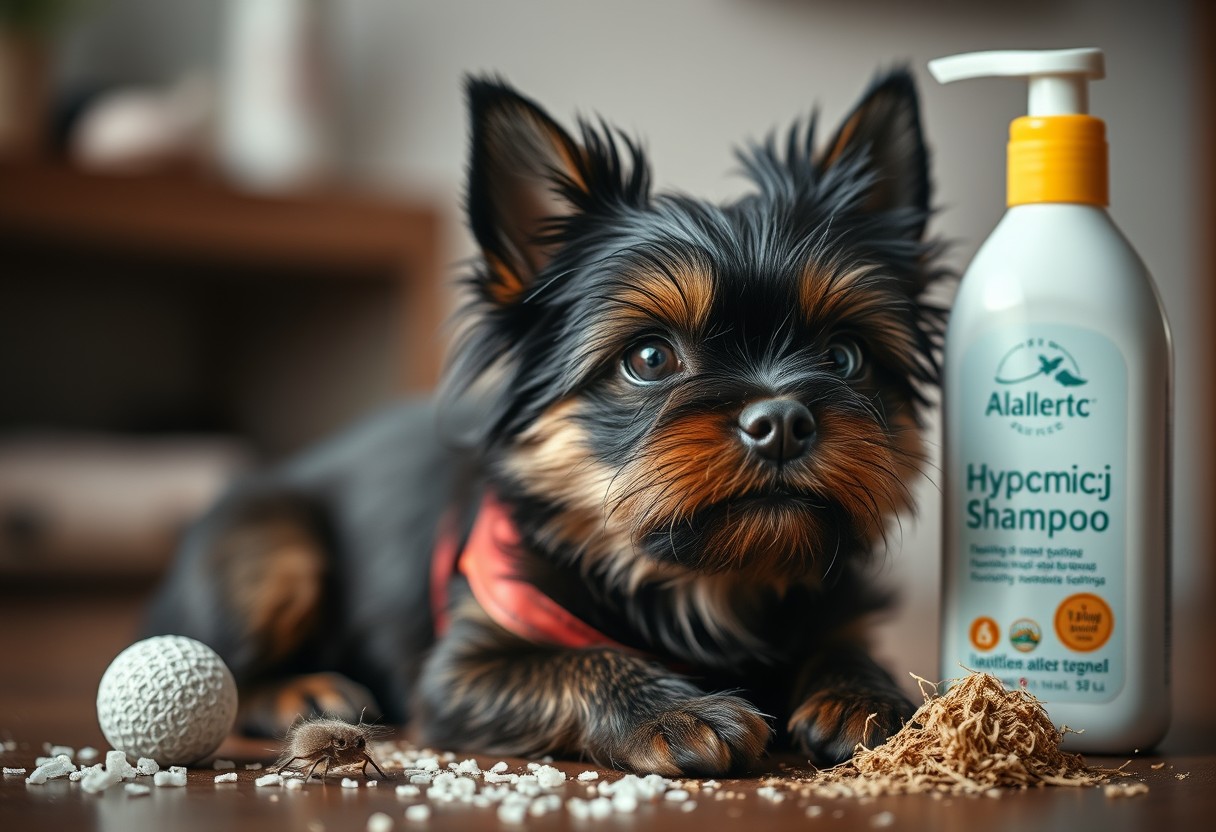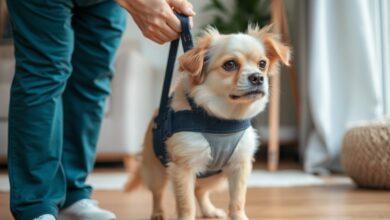Affenpinscher Allergies – 4 Common Causes and Solutions

It’s vital for you as an Affenpinscher owner to understand the allergy triggers that may affect your furry friend. Your dog is prone to various allergies that could lead to discomfort and health issues. In this post, we will explore four common causes of allergies in Affenpinschers and offer practical solutions to help you manage these conditions effectively. By identifying the sources of allergic reactions, you can ensure your Affenpinscher lives a happy and healthy life.

Key Takeaways:
- Environmental Allergens: Affenpinschers can be sensitive to pollen, dust mites, and mold, which may trigger allergic reactions.
- Food Allergies: Common allergens include proteins like beef, chicken, and wheat; a veterinary diet may help identify and manage these issues.
- Flea Allergies: Flea bites can lead to intense itching; regular flea control and preventive measures are imperative for skin health.
Understanding Affenpinscher Allergies
Affenpinschers can be prone to allergies, a condition where their immune system reacts excessively to certain substances known as allergens. This immune response can lead to inflammation and discomfort, distinguishing allergies from mere sensitivities. Allergies in your Affenpinscher can result in various health complications if not addressed properly, making it important for you to understand this condition.
What are Allergies?
Behind every allergy is an immune system that misidentifies harmless substances as threats. When your Affenpinscher encounters allergens such as pollen, dust mites, or certain foods, their immune system triggers an inflammatory response. This differs from simple sensitivities, as allergies can lead to more severe symptoms and complications, impacting the overall health of your pet.
Common Symptoms of Allergies in Affenpinschers
Symptoms in your Affenpinscher can manifest as skin irritations, such as itching or red patches, as well as digestive issues, like vomiting or diarrhea. You may also notice respiratory problems such as sneezing or coughing. Early recognition of these symptoms is vital, allowing you to seek timely medical intervention for your furry friend (an early visit to the vet can prevent more serious issues).
Symptoms can vary among individuals, but typically include excessive scratching, ear infections, and watery eyes. If you notice any of these signs, it’s important to address them promptly. Left unmanaged, allergies can lead to chronic discomfort and more serious conditions for your Affenpinscher (always consult your veterinarian to explore the best treatment options).
Allergies can impact your Affenpinscher in several ways, resulting in physical and emotional distress. Monitoring for symptoms such as skin irritations, vomiting, or coughing can improve your pet’s quality of life. By being proactive and understanding these signs, you can help mitigate the effects of allergies and ensure your dog remains happy and healthy.
Environmental Allergens
There’s no doubt that Affenpinschers can be affected by various environmental allergens. These small dogs often experience allergic reactions due to common triggers such as pollen, dust mites, and mold. Season changes, particularly spring and fall, can significantly increase the prevalence of these allergens, leading to heightened symptoms like sneezing, itching, and skin irritation.
Common Environmental Triggers
About the most prevalent allergens for your Affenpinscher include pollen from trees, grasses, and weeds, along with dust mites that dwell in household fabrics and carpets, and mold that thrives in damp areas. As the seasons change, you may notice an uptick in your dog’s allergy symptoms, making it crucial to be aware of these fluctuating triggers.
Solutions for Managing Environmental Allergens
An effective approach to reduce your Affenpinscher’s exposure to environmental allergens involves implementing several practical strategies. Consider making lifestyle changes like keeping windows closed during high pollen days, using air filtration systems in your home, and engaging in regular grooming practices to lessen allergen build-up on your dog’s coat. (Evaluating your living environment is key for your dog’s health.)
Environmental factors play a significant role in the health of your Affenpinscher, so it’s important to stay proactive. You can also explore medications or consult with your veterinarian for tailored allergy treatments that suit your dog’s specific needs. (Taking decisive action now can lead to a healthier, happier life for your furry companion.)

Food Allergies
Once again, food allergies are a common concern for Affenpinschers, leading to symptoms like itching, digestive upset, and skin issues. Your furry friend may react to common allergens such as beef, chicken, and grains. Differentiating between food allergies and food intolerances is vital, as allergies can provoke a more severe immune response. To accurately diagnose food allergies in your pet, seeking guidance from a veterinarian is vital.
Understanding Food Allergies in Affenpinschers
At the heart of food allergies in Affenpinschers lies an immune response to certain ingredients, causing symptoms ranging from skin irritations to gastrointestinal distress. Common allergens for your Affenpinscher can include beef, chicken, dairy, and grains. It’s important to distinguish food allergies from food intolerances; the former involves an immune reaction, while the latter typically results in digestive upset without immune involvement. An accurate diagnosis may require veterinary guidance to tailor a suitable diet plan.
Solutions for Managing Food Allergies
Affenpinschers require specific dietary strategies to manage food allergies effectively, such as eliminating suspected allergens through an elimination diet. Providing hypoallergenic dog food options can help as well. While transitioning to a new diet, it’s important to carefully monitor your dog’s reactions and consult with your veterinarian to ensure a balanced nutrition plan. (Choosing the right food can significantly impact your dog’s quality of life.)
Managing food allergies in your Affenpinscher starts with a comprehensive understanding of their unique dietary needs. You may consider introducing new foods gradually and observing any allergic reactions, ensuring that the transition is smooth. Elimination diets often help pinpoint specific allergies, making it necessary to return to previous diets if reactions occur. Always involve your veterinarian in the process to adjust the diet as needed and maintain nutritional balance. (Obtaining a tailored diet plan is vital for your dog’s well-being.)
Flea Allergies
Your Affenpinscher may suffer from flea allergies, a condition where their immune system overreacts to the saliva of fleas. This allergy can lead to severe itching and discomfort, as many Affenpinschers are particularly sensitive to flea bites, causing noticeable signs like redness, hair loss, and persistent scratching. Even a single flea can trigger an allergic reaction, making it imperative to maintain a flea-free environment (consider investing in preventive treatments).
What are Flea Allergies?
Across the Affenpinscher breed, flea allergies manifest uniquely through heightened sensitivity to flea saliva, leading to intense itching and inflammation. Signs of flea infestations can include excessive scratching, biting at the skin, and the presence of fleas or flea dirt in their fur. These reactions stem from an allergy to proteins found in flea saliva, resulting in discomfort and frustration for both the dog and their owner.
Solutions for Preventing and Treating Flea Allergies
Around your home, effective prevention of flea infestations is key. Utilize regular flea treatments, maintain a clean environment by vacuuming frequently, and check your Affenpinscher for signs of fleas, such as scratching or flea dirt. If your dog is afflicted, various medications and home remedies, including topical treatments and soothing baths, can alleviate symptoms and provide relief.
Preventing flea allergies in your Affenpinscher starts with consistent application of flea prevention treatments that cater to their needs. You should also engage in environmental management by cleaning bedding and carpets, which minimizes flea habitats. If fleas do become an issue, prompt medication can help manage symptoms. Incorporating natural home remedies might further enhance their comfort, so assess your options and take action quickly for the well-being of your beloved pet.
Insect and Grass Allergies
Unlike some other allergies, insect and grass allergies can be particularly challenging for Affenpinschers, as these allergens are often seasonal and can vary dramatically based on your geographic location. Insects like fleas, ticks, and mosquitoes can trigger reactions, while grasses such as Bermuda, Timothy, and Kentucky bluegrass release pollen that can cause discomfort. Different regions may have varying types of grasses and insect populations, so awareness of local flora and seasonal changes can help you identify potential allergens that worsen your pet’s allergies (consider keeping track of your area’s seasonal allergy reports).
Identifying Insects and Grasses that Trigger Allergies
With the variety of insects and grasses, it’s crucial to pay attention to what might be affecting your Affenpinscher. Fleas are a common culprit, especially during warmer months, while grass pollen counts can escalate in late spring and summer, particularly in specific regions. Observing the local flora in your area and noting seasonal variations can help identify potential allergens that affect your dog. Understanding when different grasses bloom and when insects are most prevalent can significantly assist in managing your pet’s allergic reactions (consult local gardening and pest control resources for tailored advice).
Solutions for Managing Insect and Grass Allergies
Along with identifying allergens, employing effective management techniques can make a difference in your dog’s comfort. You might consider avoiding certain outdoor areas during peak insect activity or pollen release times. Using protective clothing for your dog, like lightweight jackets during walks, may help minimize exposure. Additionally, employing dog-safe insect repellents can offer an extra line of defense. Lastly, working closely with your veterinarian to test for specific allergies can help tailor a management plan unique to your dog.
Grasses play a significant role in aggravating allergies for your Affenpinscher. It’s wise for you to identify common grasses in your area, focusing on Bermuda, Timothy, and Kentucky bluegrass, which are known to produce high pollen counts. During the spring and summer, these grasses can send pollen swirling, leading to increased allergic reactions for your dog. Being aware of peak seasons can help you plan outdoor activities, keeping your Affenpinscher comfortable. Maintaining a clean environment, regular grooming, and consulting your veterinarian for potential allergy testing can also aid in managing these grass-related allergies effectively.
To wrap up
As a reminder, managing your Affenpinscher’s allergies requires understanding the common causes and finding effective solutions tailored to your dog’s needs. From environmental triggers to food-related sensitivities, being proactive can significantly improve your pet’s quality of life. If you want to deepen your knowledge about canine allergies, consider exploring resources like Dog Allergies: What You Need to Know. Taking action will help ensure your furry companion remains happy and healthy.
Q: What are the most common allergies that Affenpinschers may experience?
A: Affenpinschers can be susceptible to various allergies, with four common causes being environmental allergens, food allergies, flea allergies, and contact dermatitis. Environmental allergens may include pollen, mold, and dust mites. Food allergies are often caused by specific proteins or grains in their diet. Flea allergies result from flea saliva, which can trigger intense itching and discomfort. Contact dermatitis typically arises from the dog’s skin reacting to certain materials, such as fabrics or cleaning products.
Q: How can I identify if my Affenpinscher has allergies?
A: Signs of allergies in Affenpinschers can include excessive itching, redness of the skin, ear infections, and gastrointestinal issues such as vomiting or diarrhea. Observing your pet for these symptoms, especially after exposure to potential allergens, can be helpful. Keeping a diary of food intake and environmental changes may also assist in identifying specific triggers. Consulting with a veterinarian for allergy testing can provide a more accurate diagnosis and guide you in managing your dog’s condition.
Q: What are effective solutions for managing Affenpinscher allergies?
A: Solutions for managing allergies in Affenpinschers generally include dietary changes, allergy medications, regular grooming, and creating a clean living environment. If food allergies are suspected, a vet-recommended elimination diet can help identify specific triggers. Antihistamines or corticosteroids may be prescribed for symptom relief. Regular bathing and grooming help remove allergens from the coat and skin. Additionally, cleaning your dog’s living space frequently reduces environmental allergens, thereby providing relief from symptoms.





